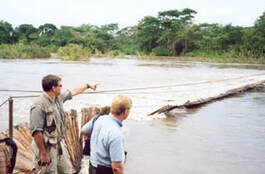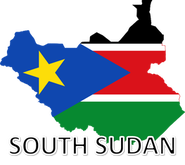 Recent mission trips to Sudan have included torrential rain, flooded rivers, a key bridge washed away, medical emergencies, vehicle breakdowns, lots of walking – including at night in an operational area - thefts, attacks and the abduction of one of our team by renegade soldiers. And much more. "Expect to be Bombed" It was just before departing on a recent mission trip that I was shown a ludicrous article entitled "Why Churches in Sudan are not Bombed!" I had to laugh reading this pathetic piece of propaganda. It had not even been a year since I had been buried under the debris thrown up by one of the 8 bombs, which all landed within 100 metres of a church we were ministering at on a Sunday morning. There had been few days since then that I had not had cause to remember the high pitched screaming of the bombs hurtling down upon us and the earsplitting noise of bombs crashing through the trees, exploding in pillars of fire and the bone jarring shock waves. Being pummelled by the debris propelled by the blast. Then the debris raining down on top of us. In the months that followed I could hardly forget that close call as my health hadn’t been the same since. I had suffered several months of flu, pneumonia and bronchitis which, because of the damage to my left lung, caused in turn by my cracked ribs, stubbornly refused to heal.
The latest Jeremiah Films release, "Terrorism and Persecution" documents the shocking systematic bombing of churches, hospitals and schools by the Sudan Air Force. It seemed incredible that anyone could deny the reality of the deliberate targeting of Christian churches and schools by the National Islamic Front government of Sudan. "Expect to be Shot" However, although ridiculous, the article also included a specific threat to myself, by name: "Peter Hammond should expect to be bombed when he comes to Sudan … he should expect to be shot on sight!" What was particularly noteworthy about this article and its threat was that it was on the official Government of Sudan, Ministry of Foreign Affairs, website! The article even gave a reason why I should expect to be bombed and / or shot "because his writings make him an enemy of the government of Sudan". So there you have it: the Muslim military dictatorship in Khartoum would never bomb churches – but they might consider bombing (or shooting) missionaries who write about it! "Abort Mission"Barely 36 hours before I was due to depart on this mission trip to Sudan, a message came through from our team there. Cancel your trip, the message read. Torrential rains have made ministry in Sudan "impossible" at this time. The river is flooded and the bridge has been washed away. The river is "uncrossable" and no meetings can be organised. I immediately sent a reply back stating that if we let assessments like this affect our determination to fulfil our mission then not much would have been accomplished in the last 20 years. I don’t believe in aborting anything, least of all my mission. "The River is Uncrossable" Upon arriving in a neighbouring country, our charter pilot gave a similar warning that he had heard that the bridge was down and the river was "uncrossable." I told him "I was crossing the Yei River before there was a bridge." He also doubted whether it would be safe or even possible to land at the designated bush airstrip. They had not been able to raise our mission base on the radio and therefore had no up to date information on the rainfall, the security situation or condition of the airfield. Their operating procedures prevented them from landing without direct radio contact with a receiving team at the destination. I did persuade him to fly us in, but he warned me that if he did not make radio contact before reaching our airfield, or if there was no one on the ground to secure the airstrip, then we would have to return without landing – at our own expense. It was a risk, but confident that God was leading us to trust Him, I knew that we had to take those risks. Where God guides, He provides. "No Fly Zone" We flew through a lot of clouds. On one occasion the pilot indicated in the distance a government of Sudan airbase. He also told me of a co-pilot who had recently been shot dead by groundfire while in flight over Sudan. It was a clearly marked Red Cross aircraft – but that had not stopped Sudanese soldiers from firing on the aircraft. The co-pilot’s head exploded all over the pilot and cockpit. Incredibly the pilot still managed to land the aircraft at Lokichoggio in neighbouring Kenya. "No Radio Contact" As we neared our destination, the tension mounted and so too did the prayers. There was absolutely no radio response from our base. What could have happened? There was a break in the clouds. We could see the swollen river pouring over where the bridge had been. At parts the Yei River had swollen seven times it’s normal width. Everything was very green and very wet. There were pools of water all over, even on parts of the airstrip. The pilot informed us that as there was no one at the airstrip and as they could not raise anyone at our mission base on the radio, we would have to abort and return to the neighbouring country. I looked over the interior of the aircraft packed full of Bibles, books and bicycles. These were all desperately needed down below. I had commitments to keep. How could we get so close and give up? Some serious negotiations followed. By God’s grace, our pilot finally agreed to land despite the failure of our ground team to secure the airstrip or respond to radio communications. The aircraft banked steeply and headed for the damp airstrip. As we hit the runway, water splashed up higher than the aircraft as we ploughed through the puddles. We had barely reached the end of the airstrip when a whole herd of cattle came out of the bush and covered much of the middle of the runway! It was just such dangers that required a ground team to secure these bush landing strips before a landing should be attempted. If that herd had broken through the tree line onto the airstrip just one minute before - there could have been a very fatal accident. Left Behind We quickly off-loaded the one tonne of Bibles, books and bicycles. It’s always somewhat unnerving to watch your air transport take off when you’re left behind in a war zone. Especially when you have no ground transport and a tonne of cargo to deliver. Well we were not actually transportless – we did have 12 bicycles! Bibles On Bicycles With the help of some local Christians who started to arrive at the airstrip, we succeeded in ferrying the Scriptures and educational materials to the river. It had been some time since I had last ridden a bicycle but after 6 trips between the airfield and the river I felt I was becoming quite adept at balancing heavy loads across very uneven tracks. At the riverbank we looked with amazement. In seven years of ministering in Moruland, I had never before seen the river so high, so full, so wide and flowing so fast. The original bridge, built by the British, had been blown up by the Muslim government forces as they retreated from the area in 1991. Until missionaries built a footbridge over the shattered pillars of the old bridge in 1998, river crossings were done mostly by boat. Now the floodwaters had ripped apart most of the footbridge. Most of the footbridge was under water and the pillars were being moved by the tremendous force of the floodwaters. We had carried so many tonnes of Bibles over this footbridge – including the very first complete Bible in the Moru language. Now we would have to use boats again. But the torrent of water was far too turbulent to risk a boat crossing at this time. Nor was any boat available. "It’s Impossible" The local people who had helped us ferry our supplies to the riverbank pointed out that several people had drowned attempting to cross the river. "It’s impossible to cross the river now!" they told us. When unseasonal torrential rains caused flooding and washed away the only bridge for hundreds of miles, the only way across was hand over hand - by cable.My co-worker from the United States, John, used to be in the Rangers. "No river is impossible!"he smiled. John pointed out that one of the steel cables to which the walkway had been attached was still suspended above the waters. We noticed that the cable was vibrating and under the force of the water, was beginning to come loose from where it was anchored in the ground. We warned the people to stand back -whenever the cable snapped or came loose, it would rip through anything, or anyone, in its path."Ideally we need carabineers, a sling, a harness and pulley, some rope and gloves," said John. "And I prepositioned all that equipment with the ground team on the previous trip for just such an eventuality." "But that’s all at the base on the other side of the river!" I noted. "Rangers Show the Way" "Well" said John, "Let the Rangers show the way." And with that he reached out and took hold of the cable and started climbing hand over hand, ankle over ankle, across the roaring waters. In the army we did this sort of thing with ropes – but on a frayed one inch steel cable, without gloves, John’s legs and hands began to be badly rubbed raw and cut up. Pieces of John’s flesh were left on some rough parts of the cable. Incredibly he kept going, but the cable was sagging and just 10 feet from the other bank, his arms and legs badly cut up, John fell in to the water and disappeared from view. There was so much debris – including whole trees – being washed down that I was worried that he would get snagged under water by the mangeled iron remains of the blown up bridge or ensnared in the broken remnants of the footbridge or knocked unconscious by the flowing logs and branches. After an agonising, heart stopping time of suspense John resurfaced about a hundred metres downstream! He had been swimming underwater towards the shore and surfaced close to a thorn tree which he quickly grasped – causing more damage to his injured hands. In a few minutes John was walking to our mission base to fetch the equipment which would enable us to ferry our literature and supplies across the raging river. Deserted At the base John learned that our ground team had packed up and driven out – back to South Africa – just a few hours before. The filthy, disorganised and chaotic state of our stores and all the broken equipment told a story. The Sudanese staff members explained how the team’s relationships with the local Church had deteriorated in the same way as the mission station had. "When they heard your plane flying overhead – they fled!" explained one. They had also cancelled my planned seminars and dismissed all the students of the school a few days before. Over the years I’ve seen many people crack up, or give up, under the severe stresses of the field. Extreme heat, clouds of insects, tropical diseases and prolonged dangers along with all the cross cultural complications, linguistic difficulties and logistical frustrations can combine together to drive even normally strong people to bitterness or irrational despair. ReinforcementsSoon after this, however, our overland team, Tim and Hansie, arrived after an epic 7200 km (4500 miles) drive. In 18 days they had crossed 7 international
0 Comments
Leave a Reply. |
More Articles
All
Archives
February 2021
|
"And Jesus came and spoke to them, saying, “All authority has been given to Me in heaven and on earth.
Go therefore and make disciples of all the nations, baptizing them in the name of the Father and of the Son and of the Holy Spirit,
teaching them to observe all things that I have commanded you; and lo, I am with you always, even to the end of the age.” Amen.” Matthew 28: 18-20
Go therefore and make disciples of all the nations, baptizing them in the name of the Father and of the Son and of the Holy Spirit,
teaching them to observe all things that I have commanded you; and lo, I am with you always, even to the end of the age.” Amen.” Matthew 28: 18-20
|
P.O.Box 74 Newlands 7725
Cape Town South Africa |
|



 RSS Feed
RSS Feed
